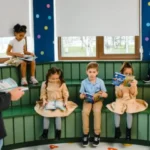
15 strategies to help your kids become more responsible
August 5, 2022Responsibility is important for kids for a number of reasons. First, it teaches them to be accountable for their actions. Second, it helps them to develop a sense of ownership and pride in their work. Third, it instills in them a sense of self-discipline. And fourth, it helps them to understand the importance of taking care of others and their belongings.
If you’re looking for ways to teach your kids responsibility, you’ve come to the right place. In this blog post, we’ll share 15 tips for teaching responsibility to kids. From setting expectations to leading by example, we’ll help you equip your kids with the skills they need to be responsible citizens.
15 tips for teaching responsibility to kids
As a parent, you want your child to grow up to be a responsible adult. But how do you teach responsibility to kids?
Here are 15 tips for teaching responsibility to kids:
1. Model responsible behavior.
As a parent, you are your child’s first role model. Show them what it means to be responsible by being responsible yourself.
2. Help them understand why responsibility is important.
Talk to your child about why responsibility is important. Help them understand that it’s a key part of growing up and being a successful adult.
3. Encourage them to take on small responsibilities.
Start teaching responsibility to kids by encouraging them to take on small responsibilities around the house. This could be things like feeding the pets or helping to set the table.
4. Help them to understand and follow rules.
Rules are a key part of responsibility. Help your child to understand rules and why it’s important to follow them.
5. Encourage them to stick to commitments.
If your child makes a commitment, encourage them to stick to it. This could be things like completing a task they’ve agreed to do, or keeping a promise they’ve made.
6. Help them to develop a strong work ethic.
Teach your child the importance of hard work and dedication. Help them to understand that success comes from putting in the effort.
7. Teach them about managing money.
Money management is an important part of responsibility. Teach your child about budgeting, saving, and spending wisely.
8. Encourage them to be independent.
Encourage your child to be independent and to do things for themselves. This could be things like getting dressed in the morning or making their own breakfast.
9. Help them to develop self-control.
Self-control is an important part of responsibility. Help your child to learn how to control their emotions and impulses.
10. Encourage them to be organized.
An organized lifestyle is a responsible lifestyle. Help your child to learn how to organize their time, tasks, and belongings.
11. Help them to set goals.
Teach your child how to set goals and how to achieve them. This could be things like saving up for a toy they want, or completing a task in a certain amount of time.
12. Encourage them to be thoughtful.
Teach your child to think about the consequences of their actions. Help them to understand how their actions can affect others.
13. Help them to be resilient.
Resilience is an important part of responsibility. Teach your child how to bounce back from setbacks and how to keep going even when things are tough.
14. Teach them about taking care of their belongings.
Teach your child how to take care of their belongings. This could be things like putting away their toys when they’re finished with them, or taking care of their clothes so they last longer.
15. Help them to develop a positive attitude.
A positive attitude is an important part of responsibility. Help your child
to see the good in situations and to find the silver lining in setbacks.
8 The benefits of teaching your child responsibility
1. They’ll learn the value of hard work.
Teaching your child responsibility will help them understand that hard work pays off. They’ll learn that if they want something, they have to work for it – and that’s a valuable lesson to learn.
2. They’ll be more independent.
As your child grows, you want them to be as independent as possible. Teaching them responsibility will help them be more independent, as they’ll learn how to take care of themselves and their belongings.
3. They’ll be more organized.
A responsible child is usually a more organized child. Teaching your child to be responsible for their things will help them develop good organizational skills that will benefit them throughout their life.
4. They’ll be less likely to take risks.
A responsible child is usually a child who is more cautious and less likely to take risks. And, while you obviously don’t want your child to be a scaredy-cat, it’s important for them to understand the importance of safety.
5. They’ll learn how to budget.
If you teach your child to be responsible with their money, they’ll learn how to budget and save. This is a valuable skill that will benefit them throughout their life.
6. They’ll be more responsible citizens.
As your child grows, you want them to be a responsible citizen. Teaching them responsibility will help them understand the importance of taking care of their community and the environment.
7. They’ll be less likely to engage in risky behavior.
A responsible child is usually a child who is less likely to engage in risky behavior, like drugs, alcohol, or unprotected sex. Obviously, you want to protect your child from these risks, and teaching them responsibility is a great way to do that.
8. They’ll be happier.
teaching your child responsibility will help them be happier. Why? Because they’ll feel a sense of accomplishment and pride when they take care of their things and do their chores. And that’s a great feeling for anyone – child or adult.
Finally,It is important to remember that children are not born with a sense of responsibility – it is something that must be taught. By setting a good example, being consistent with expectations and consequences, and providing opportunities for your child to practice taking responsibility, you can help them develop this important character trait.









